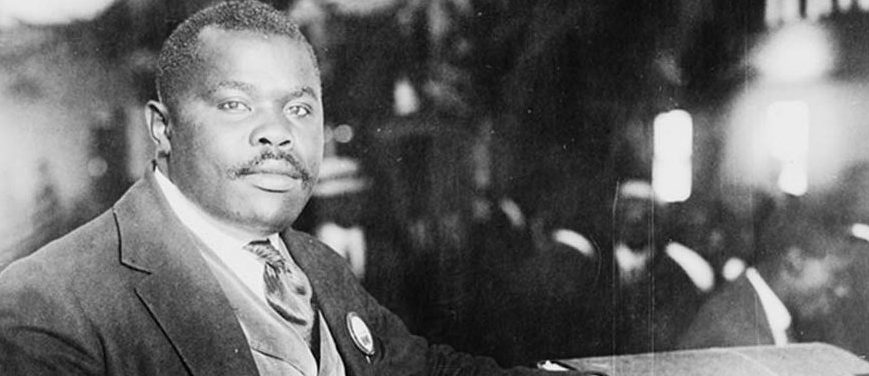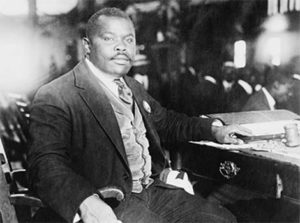
Marcus Garvey’s Dark Mirror
Marcus Garvey’s Dark Mirror
In NPR’s February 17th episode of Throughline, Marcus Garvey takes center stage as an enigmatic, underrated, revolutionary figure on a mad quest to reconnect former American slaves to their motherland via the Black Star Line. Marcus Garvey is not a widely discussed figure for a few reasons, chiefly the fact that he is a revolutionary. He possessed a vision on Blackness that transcended culture and context, a nation of people bound impregnably by race alone. However, this grand ideal for the freed children of the African Diaspora would never come to fruition, much like the fated black star line.
There is a great metaphor in the Black Star Line, it encapsulates everything about Garveyism. As mentioned in the podcast, it would eventually be Garvey’s ruin when it proved to be much less profitable than expected, causing Garvey to begin selling bad stock in a bankrupt company. However, the Black Star Line persists in the cultural imagination, through television shows and in literature. There is something common in the motivations that built the Black Star Line, in the dream the line came to represent. However, our lives as Black people have only grown increasingly complex since Garvey’s death in 1940. Even the dream of sailing back to Africa seems to have lost its allure through the maelstrom of time. And yet, Garvey and his ideas seem undying, like embers on dry grass that refuse to dim. Instead, they splinter off into wild emanations like Pan-Africanism and Rastafarianism. In this way, Garveyism still affects our lives especially within the Black church. In some sense, Garvey’s view of the Black church became realized decades later during the civil rights movement. One the other hand, his worldview would birth forth Rastafarianism, a derivative distillation of his beliefs. Like two sides of the same coin, these two forces fight for Garvey’s legacy and so too are we placed between them as people affected by these very ideas. By finding our place within this conflict, we are able to live more nuanced, more freelives by choosing what ideas we allow to influence our decision on a daily basis. But in order to develop in this area, we first need to understand what Garveyism is and how it differs from its Rastafarian cousin.
The following quote is from an article written 1962 edition of the Journal of Negro Education by John L. Graves. He quotes Garvey as saying, “ If the white man has the idea of a white God, let him worship his God as he desires. Since the white people have seen their God through white spectacles, we have only now started out to see our God through our own spectacles[…] we shall worship Him through the spectacles of Ethiopia.”

In a sense, this sentence tells you everything one needs to know about Marcus Garvey’s relationship with Christianity. The tenants, cultural additions, and governing philosophy of a religious belief is not so important as the Black authenticity expressed throughout said belief. This authenticity is not expressly depicted through art or skin color but specifically nationalism. Garvey presents Ethiopia as the heart of Black culture, an imagined ancestral motherland whose culture presents some sort of refuge for the vision of a unified black identity. This view of religion is quite utilitarian. It removes the supernatural element of belief from religion and places the culture and ambition of men above the will of God. While this might seem like a bold claim, it is actually pretty common. For instance, the rise of the Anglican church only occurred due to the fact that King George the 3rd wanted to divorce his wives so he created a national religion with himself at the head. To a degree, origins of African-American churches during enslavement had similar roots. For some slavemasters, allowing slaves to practice Christianity became simply another method of control. There were slave bibles specifically edited to remove any part concerning fair treatment and release of slaves. Even Mormonism coincided with the rising national pride of a newly independent America and the buzzing fervor of manifest destiny. In all of these cases, the man-made objective that causes the schism (in these scenarios) became central to the movement for the remainder of its existence. For the Anglican Church, a national church would give rise to a new sense of national identity during an age where such ideas were novel. For Slave Churches, obedience and patience in the face of oppression became the objective. In the heights of the Civil Rights era, Martin Luther King Jr. took these same tenants and used them against those same oppressive forces through peaceful resistance. Even the Mormons today are one of the fastest growing religions both at home and abroad due in part to their potent evangelicalism and motivating sense of divinity. When viewed through this context, it is no wonder that Garvey’s ethnocentric view or religion would spawn a belief system for the diaspora, by the diaspora. However, before I begin to describe how Rastafarianism and Garveyism intersect, there are a few more ideas Garvey espoused that are important to understand.
For Marcus Garvey, assimilation was never an option. In my own words, Garveyism is an attempt to create a western system of culture for the African Diaspora. However, instead of creating a wholly organic culture, a lot of Garvey’s ideas are copied directly from the governing political ideologies of the time. A good example of this is racism in and of itself. Garvey firmly believed in the separation of the races, hence why the Black Star Line became such an important part of his life. He was so committed to this idea that he would go on to give several speeches at KKK rallies extolling the virtues of Jim Crow. For Garvey, the oppression of his life was not so much that racism existed. This, to him, was the natural order. Instead, the real oppression was that Africa and the people from there were shattered and divided in a world that was becoming increasingly connected and organized along racial lines.
In this sense, he was a Black nationalist. He believed that people could be categorized along racial lines and that these groups deserved autonomy. Garvey sought to center the Black world around Ethiopia, one of the oldest centralized states on the African continent. He hoped to foster a national sense of unity across the entire African Diaspora in order to resist the colonial powers threatening Black people at home and abroad. I wouldn’t go so far as to call him a Black supremacist, in a way, he had a keen sense of equality. He believed that given a fair hand, people will work to increase their own quality of life and legacy. This idea of self-determination is common today, however, we tend to apply it on an individual basis. To Garvey, personal advancement is the responsibility of the race as a whole and only when the races are unified will there be social harmony. In the March 1st, 2003 edition of the Journal of Black Studies, Otis B. Grant quotes Garvey as saying,
“African Americans should stop making[…] noise about social equality, giving the White people the idea that we are hankering after their company, and get down to business and build up a strong race, industrially, commercially, educationally and politically, everything social will come afterwards.”
To me, this is an excellent encapsulation of Garvey’s beliefs. Garveyism’s goal is racial unity, but the means of reaching that point seems to be copying the popular institutions of one’s society and creating replicas exclusively for the profit and benefit of your own race. While publicly, Garvey might have downplayed his relationship to the church, he was very interested in continuing his Garveyite project within the Black Christian community. In 1921, he attended the foundational ceremony of the African Orthodox Church in Chicago. I find this very interesting because instead of trying to revive traditional African belief systems, Garvey endorsed a specifically Christian, ethnic worldview for his ideal vision of society. This process of replication then assimilation of western ideas is the heart of Garveyism. Instead of trying to find something authentic and new from the black perspective, he sought to create a mirror of the world around him. Viewed in this way, the fate of the Black Star Line and the rise of Rastafarianism seem soaked in bitter irony.
There was a lot of hype around the Black Star Line from both its proponents and its detractors. For Black people, it represented something of their own. However, by this time in his career, Garvey was a bit of a social pariah for giving a series of speeches at KKK meetings. Today, we would just say he was canceled. He ended up getting cheated out of ships of good quality and then was forced to hire an incompetent crew for those ships. In order to keep his operation running, he essentially committed mail fraud and was sentenced to 5 years imprisonment in 1925. The reason that I find this so ironic is because this venture inflamed every contradiction within his ideology. In a world where races must compete as unified blocks, when one race controls a majority of the resources in an area, they are not inclined to extend those resources fairly across racial lines. So instead of getting the quality ship that you pay for, you get cheated and nobody cares and then they throw you in jail. Had there been more racial equity between Garvey and his business associates, perhaps they would have been inclined to see him as a human being and not as someone unworthy of the decency of fair trade.
Matthew 6:24 says plainly that man cannot serve two masters. To me, Garvey’s vision of Christianity attempts to do just this. By using Christianity as the catalyst for Pam-African, nationalist sentiment, Garvey positions Ethiopia as the new chosen land for Black people. Salvation, then, becomes less an exercise in humanity but a right of birth and race. Much like the Black Star Line that came before, Garvey’s vision for Christianity would ultimately collapse and give rise to something much more potent and sincere. In a follow up piece, we will discuss Marcus Garvey, his view of Christianity, and his relationship with Rastafarianism.

